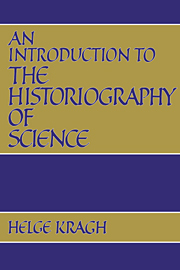Book contents
- Frontmatter
- Contents
- Preface
- 1 Aspects of the development of the history of science
- 2 History of science
- 3 Objectives and justification
- 4 Elements of theory of history
- 5 Objectivity in history
- 6 Explanations
- 7 Hypothetical history
- 8 Structure and organization
- 9 Anachronical and diachronical history of science
- 10 Ideology and myths in the history of science
- 11 Sources
- 12 Evaluation of source materials
- 13 Scientists' histories
- 14 Experimental history of science
- 15 The biographical approach
- 16 Prosopography
- 17 Scientometric historiography
- Notes
- Bibliography
- Index
1 - Aspects of the development of the history of science
Published online by Cambridge University Press: 30 November 2009
- Frontmatter
- Contents
- Preface
- 1 Aspects of the development of the history of science
- 2 History of science
- 3 Objectives and justification
- 4 Elements of theory of history
- 5 Objectivity in history
- 6 Explanations
- 7 Hypothetical history
- 8 Structure and organization
- 9 Anachronical and diachronical history of science
- 10 Ideology and myths in the history of science
- 11 Sources
- 12 Evaluation of source materials
- 13 Scientists' histories
- 14 Experimental history of science
- 15 The biographical approach
- 16 Prosopography
- 17 Scientometric historiography
- Notes
- Bibliography
- Index
Summary
Although the history of science as an autonomous academic discipline only developed in the 20th century, activities that might justifiably be described as early forms of history of science have been taking place for centuries. Historical descriptions and analyses have always followed the development of science. Indeed, even a superficial consideration of the history of science in former times reveals that many of the central historiographical problems discussed in modern history of science can also be encountered in earlier centuries.
Throughout most of the period in which science developed, it was learnt and cultivated as part of a historical tradition that was indistinguishable from science proper. In Classical times and in the Middle Ages in particular, the usual form of cultivation of science involved relating to earlier thinkers. Critical commentaries and analyses of the Classical works were made and these were used as a point of departure for new thought and contributions of current interest. When Aristotle wished to say something about atoms and the void, he reproduced parts of the history of atomism and embarked on a discussion with the long-departed Democritus. When a Greek mathematician wanted to solve a problem, the natural way to proceed was to begin by giving an account of the history of that particular subject, which was regarded as an integral part of the problem.
Classical historians were interested first and foremost in contemporary history and did not consider it of much value to consider earlier events or developments in a historical perspective.
- Type
- Chapter
- Information
- An Introduction to the Historiography of Science , pp. 1 - 19Publisher: Cambridge University PressPrint publication year: 1987



